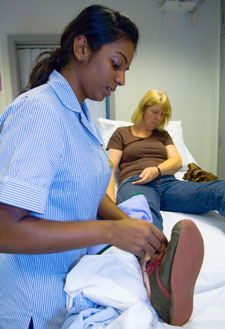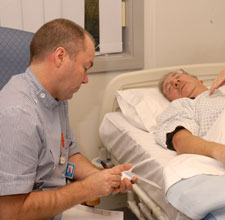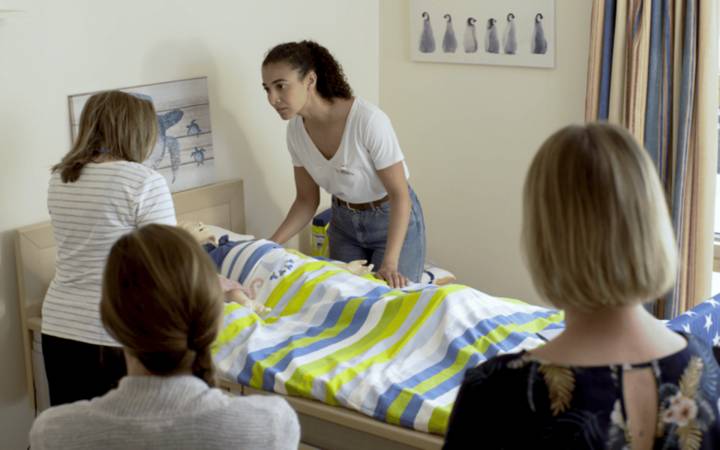Experts welcome Willis Commission's support for nurse education
Posted Wednesday 7 November 2012
 The report by the Willis Commission on Nursing Education has reinforced the crucial role universities play in training the healthcare workforce, according to a leading academic. Professor Fiona Ross, Dean of the Faculty of Health and Social Care Sciences, run jointly by Kingston University and St George's, University of London, said she welcomed the support Lord Willis had given universities and the important role degrees played in preparing nurses to provide high quality care.
The report by the Willis Commission on Nursing Education has reinforced the crucial role universities play in training the healthcare workforce, according to a leading academic. Professor Fiona Ross, Dean of the Faculty of Health and Social Care Sciences, run jointly by Kingston University and St George's, University of London, said she welcomed the support Lord Willis had given universities and the important role degrees played in preparing nurses to provide high quality care.
The findings, released this week, come after Lord Willis of Knaresborough, former Liberal Democrat Member of Parliament for Harrogate, was asked by the Royal College of Nursing to come up with a set of recommendations on the future of nursing education. He looked at what was needed to create a workforce of competent, compassionate nurses fit to deliver future health and social care services.
The commission found no major shortcomings in nursing education and stated nurse training should have patient-centred care at its heart. It said health service providers needed to be full partners in its provision, get to grips with governance and leadership of education within healthcare trusts and show greater commitment to developing joint roles with universities.
Professor Ross gave evidence to the commission and was one of a select group of expert advisers called on as the report took shape. "Lord Willis' findings lay to rest concerns that education and degrees lead to failures of care - in fact it goes so far as to say there is not a shred of evidence to support this view," Professor Ross said.
 The report recognises numerous examples of good work from universities all over the United Kingdom, including Kingston University and St George's, University of London. It cited Kingston and St George's as demonstrating good practice in patient and public involvement in nurse training. The Faculty established its Service User and Carer Consultative Forum 10 years ago to put patients and their families at the heart of education programmes. It also appointed an honorary fellow in public and patient engagement, to provide advice on service user involvement in curriculum development and teaching.
The report recognises numerous examples of good work from universities all over the United Kingdom, including Kingston University and St George's, University of London. It cited Kingston and St George's as demonstrating good practice in patient and public involvement in nurse training. The Faculty established its Service User and Carer Consultative Forum 10 years ago to put patients and their families at the heart of education programmes. It also appointed an honorary fellow in public and patient engagement, to provide advice on service user involvement in curriculum development and teaching.
Lord Willis emphasised the need to get the balance right between academic achievement and ability to care when recruiting trainee nurses. He highlighted the Faculty's use of role play as a promising approach to finding candidates with the right mix of skills. The exercises - in which prospective students are asked, for example, to break bad news to someone - are designed to gauge applicants' honesty, integrity, compassion and respect, to help select those with the attributes needed to become good nurses.
The Faculty's work with doctors' surgeries and practice nurses to increase the number of community-based placement opportunities was also highlighted as one of a number of creative solutions to students' learning outside hospitals.
In her evidence to the commission, Professor Ross raised her concerns about the burden universities faced providing data to a number of regulators, commissioners and professional bodies. Dr Julia Gale, head of nursing at the Faculty, shared similar concerns and provided the commission with evidence of duplication in reporting requirements. Dr Gale welcomed Lord Willis' subsequent recommendation that regulation and inspection of universities be streamlined to increase effectiveness and reduce the pressure on higher education institutions.
Dr Gale added that there had traditionally been a tendency to look back and think nursing was wonderful in years gone by, but contended that nurses, and patients, had in fact had a rawer deal then than they did now. A major challenge going forward was to try to get the right people into the profession to provide a high standard of care for the public.
"Nursing education is not about looking backwards. It's about looking to the future and preparing a new generation of nurses to deliver services that will inevitably be different to those of the past," Dr Gale said.
- Find out more about studying nursing at Kingston University.
Contact us
General enquiries:
Journalists only:
- Communications team
Tel: +44 (0)20 8417 3034
Email us



